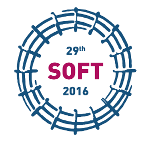Speaker
Sergi Colominas
(Analytical Chemistry)
Description
Lithium 6 is the substance required to generate in-situ tritium in fusion reactors. Because of that, lithium monitoring in lithium-lead eutectic (Pb-15.7Li) is of great importance for the performance of the liquid blanket. Lithium measurements will be required in order to proof tritium self-sufficiency in liquid metal breeding systems. On-line lithium sensors must be designed and tested in order to accomplish these goals.
Solid state electrolytes have been successfully used for gas sensors in many applications. Sensors based on solid state electrolytes have several advantages: generally are stable compounds which can withstand the harsh chemical environment of the melts, the ionic conductivity increases with the temperature and the output signal (cell potential) is easy to measure.
Lithium conducting electrolytes for molten metals are under development at the Electrochemical Methods Laboratory at Institut Quimic de Sarria (IQS) at Barcelona. Its qualification and performance are being tested. Li-probes for molten metals will be based on the use of ceramic type solid state electrolytes.
In the present work, LiYO2 and Li4SiO4 were synthesized in order to be tested as solid state electrolyte for Li-probes. Amperometric measurements of the synthesized ceramic elements were performed at different lithium concentrations using lithium molten salts as lithium containing samples.
Co-authors
Eduard Juhera
(Analytical Chemistry, Institut Quimic de Sarria, Barcelona, Spain)
Jordi Abella
(Analytical Chemistry, Institut Quimic de Sarria, Barcelona, Spain)
Sergi Colominas
(Analytical Chemistry, Institut Quimic de Sarria, Barcelona, Spain)

